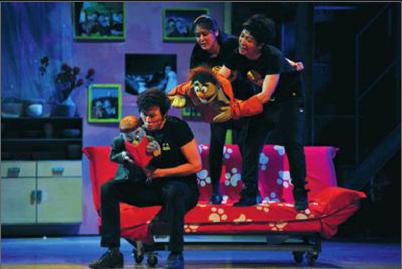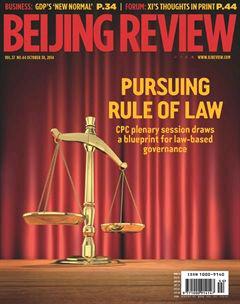Bringing Broadway To China
By+Ji+Jing

The Broadway hit Avenue Q, which won the 58th Tony Awards for Best Musical, Best Score and Best Book in 2004, has been brought to Chinese stages with an increasingly common twist—the songs are now in Mandarin.
After a successful run last year of 50 shows in Shanghai and another 32 in Beijing in the first half of this year, the musical moved on to Guangzhou and Shenzhen in south Chinas Guangdong Province in September and October respectively. Now the producers have their eyes set on provincial capitals such as Nanjing, Hangzhou and Wuhan and a return to Shanghai.
The show, which is set in New York City, tells the story of a recent college graduate named Princeton who moves into an apartment on the fictional Avenue Q of the musicals title. There he meets a group of colorful characters, most of whom take the form of puppets, all adjusting to adulthood and finding their purpose in life.
In an interview with the website Gothamist. com, creators Jeff Marx and Robert Lopez said that their inspiration for Avenue Q—and part of the reason for using puppets—was that “life isnt as easy as weve been led to believe. Our parents told us we were special ... But when we got out of college, we were faced with rent bills and temping and entry-level jobs, if we were even lucky enough to get those … We found to our horror that we werent all that special after all.”
Successful adaptation
Yang Jiamin, CEO of Seven Ages Investment Co. Ltd., who brought the production to China, said that in addition to translating the scripts into Chinese, the Chinese version changed the background into one which combines the city landscapes of Beijing, Shanghai and Qingdao. She added that to ensure the quality of the performance, the company recruited most of the actors from the Shanghai Theater Academy, the Shanghai Conservatory of Music and the Central Academy of Drama in Beijing.
Also, in order to make it easier for Chinese audiences to relate to the story, the production team changed some of the characters names in the original. For example, the character Princeton was turned into Tsinghua, the name of a prestigious Chinese university. A line or two is even spoken in the Shanghai dialect to make the script feel more natural.
“We tried to localize nearly every gag in the original to make Chinese audiences laugh,”Cheng He, the translator of the script to Chinese who works for Seven Ages, told China Daily in June. “We threw away jokes that didnt translate well and replaced them with gags that our audiences can better relate to.”
The musical has received mostly positive responses from Chinese audiences for its songs, sets and relevance to viewers, most of whom are young people who have only recently graduated from college. The tickets, which average 200-300 yuan ($33-49), have been selling well and in Shanghai, 95 percent of the 600 seats in the theater were occupied on average.
Pursuing a dream
Seven Ages was founded just a few years ago to bring Broadway musicals to China. Yang, its founder, developed an interest in Western musicals while she was still an English major at Peking University, having taken courses in Western drama, musicals and opera.
After graduating from university in 2009, Yang went to Japan to work for the Strategic Business Innovator Group, where she learned how business startups worked.
During her spare time in Japan, Yang watched musicals produced by the Shiki Theater Co. Inspired by the success of the company, which has bought the copyright to Western musicals and adapted them for Japanese audiences since the 1980s, Yang de-cided to start a similar company in China.
“Musicals have a long history in the West. However, they remain relatively unpopular in China,” said Yang. “Even in first-tier cities like Beijing and Shanghai, musicals account for only a small proportion of peoples trips to the theater. Therefore, theres a huge potential for this art form to thrive in China.”
Yang came back to Beijing in 2011. Having made up her mind to start what would eventually become Seven Ages, she sought her drama teacher Joseph Graves advice on which musical to adapt first. Graves suggested Man of La Mancha because he regarded it to be one of the best Western musicals. The musical, which made its Broadway debut in 1965, is adapted from a non-musical teleplay inspired by Spanish novelist Miguel de Cervantes and his 17thcentury masterpiece Don Quixote.
Graves, a renowned Broadway director and actor, has been teaching drama courses at Peking University while assuming the position of the artistic director of the universitys Institute of World Theater and Film. During his 12 years in the position, he produced or directed more than 80 plays, including the Chinese premieres of many Western plays.
Graves helped Yang persuade Mitch Leigh, the composer and copyright holder of Man of La Mancha, to lease the rights to Yang for 100,000 yuan ($16,336). Yang set up her company at the beginning of 2012 with 400,000 yuan ($65,344), which came from her own sav- ings and money from her parents.
Performed entirely by Chinese actors, with the exception of Graves who acted as both Don Quixote and Cervantes, the English edition of Man of La Mancha enjoyed a run of 40 shows in Beijing in 2012.
With limited funds for advertisement, Yangs team made use of social networking platforms such as Weibo—Chinas equivalent of Twitter—and WeChat—an instant messaging app—to promote the musical. The company also used e-commerce websites, telephone and apps to sell tickets. The musical earned 2 million yuan ($326,717) in box office for the first round of performances, proving to be a small commercial success.
“Although Don Quixote is set in Spain, Chinese audiences, especially middle-aged viewers who have read the novel, are able to find sympathy with the protagonists idealism,”said Yang.
Shoestring budget
Yang is not the first to produce Chinese versions of Western musicals. Shanghai-based United Asia Live Entertainment produced Chinese editions of Mamma Mia! and Cats in 2011 and 2012, respectively. Both musicals were successful, with the latter raking in 72 million yuan ($11.8 million) during the first round of performances.
Before that, Western musicals such as Beauty and the Beast and Les Miserables were put on in Chinese theaters by their original cast. However, such musicals often charge as high as 500-600 yuan ($82-98) in order to cover their heavy running costs. Another shortcoming is that actors cannot ensure long-lasting or regular stops in China as they often have to go back to their home countries to perform.
Chinese versions which employ local actors cost less and are easier for audiences to understand. Yang said an average ticket price of 200-300 yuan can cover the costs of such productions if 100 performances are given in a year.
Shen Zhenhe, Deputy Director of the Chinese Association of Musicals, said low-budget musicals such as Man of La Mancha will be a trend for imported musicals and Seven Ages has provided a successful commercial model for importing Western musicals.
Yang said that her company will present How to Succeed in Business Without Really Trying, which premiered on Broadway in 1961, in Beijing in January 2015. She is committed to selecting musicals that have already had positive commercial results and won awards abroad. Additionally, they should have relevance to Chinese audiences.
She plans to import one musical every year and produce a Chinese version of Man of La Mancha.

